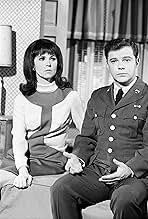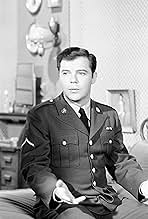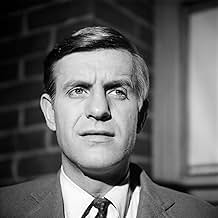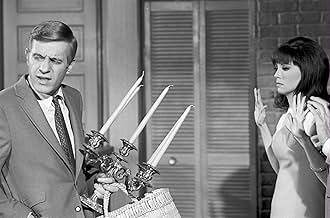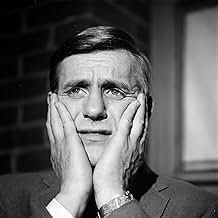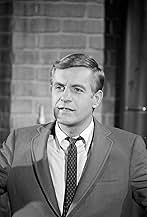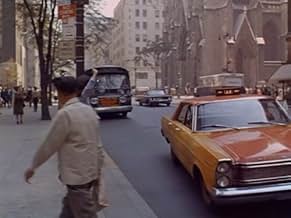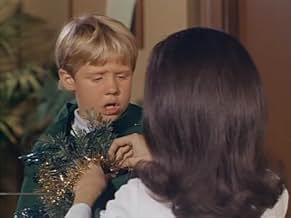AVALIAÇÃO DA IMDb
7,3/10
3,5 mil
SUA AVALIAÇÃO
Uma aspirante a atriz se muda de sua cidade natal, Brewster, para tentar chegar a Nova Iorque, tendo que aceitar vários trabalhos "temporários" não convencionais para se manter entre suas vá... Ler tudoUma aspirante a atriz se muda de sua cidade natal, Brewster, para tentar chegar a Nova Iorque, tendo que aceitar vários trabalhos "temporários" não convencionais para se manter entre suas várias audições e papéis.Uma aspirante a atriz se muda de sua cidade natal, Brewster, para tentar chegar a Nova Iorque, tendo que aceitar vários trabalhos "temporários" não convencionais para se manter entre suas várias audições e papéis.
- Indicado para 7 Primetime Emmys
- 3 vitórias e 11 indicações no total
Explorar episódios
Avaliações em destaque
"That Girl" is one of those shows that I enjoyed during it's first run on ABC and in it's reruns over the years, but it's been many years since i saw this as it has not been on TV in a while. The re-discovery of this on DVD reveals that it is even better than I remember it. The cast in all instances is first-rate, and the scripts are crisp, funny, full of heart and do not date one bit. Marlo Thomas supposedly had a hand in most of the aspects of this classic series, and I say a great job well done. Like John Forsythe in "Bachelor Father", this show was her baby and no show could have had a better mother. ME-TV has just begun re-running this as of this writing, and my partner and I were laughing out loud at many of the antics on the marathon which launched the series on New Year's Day. The film quality of the show has been so beautifully preserved that it looks brand-new. The 1960s background makes the series a kind of time capsule back to those fashions and some of the early episodes especially feature some great location footage shot in N.Y.C. which add to the "theatrical" look of this series. Each episode has the look of a mini-movie, being shot with one camera. The laugh-track is present but not overdone or intrusive. The format of the single girl trying to make it on her own would be echoed a few years later in the super-classic "Mary Tyler Moore" show. "That Girl" had great writing throughout it's five seasons, and Ms. Thomas wisely opted out of the show before it became stale as so many other long-running shows of the period did. She also avoided knuckling under to the network by not having Ann and Donald marry. This was her personal decision and in retrospect, a wise one. Marlo Thomas herself, being the daughter of the great Danny Thomas, had to prove herself with this series and boy, did she ever. Having "Make Room For Daddy", one of the great shows of it's own era, and "That Girl", one of the greats of the 60s, one hopes that there will be another generation of the Thomas family to give us yet another great series to enjoy. If this review sounds like a love letter to Marlo Thomas, so be it. It is.
Four years before the debut of the Mary Tyler Moore Show, this was the first show to feature an independent woman who wanted to make it on her own without having to rely on her parents or her boyfriend. This was a great show with a great cast that really worked well together. The other thing that I really loved about this show was the fact that the humor was very broad and that Ann, even though she was independent, often found herself in some very awkward situations. I especially loved the last season in which we really saw Ann's relationship with Donald really blossom as they finally became engaged. Too bad it ended before they walked down the aisle.
I wonder how many preteen boys had a crush on Marlo Thomas like I did during the run of this program. She was soooo beautiful, and Ted Bessell seemed like an awfully lucky guy to me, except that he had to live in constant fear of Ann Marie's father, which was realistic enough as Mr. Marie was rather menacing, which by the time the series ended I realized was because he considered the Donald Hollister character a threat to his daughter's virginity. (Wonder how much different, if any, Danny Thomas was about that issue in real life?) In retrospect, this show requires suspension of disbelief even more than most sitcoms, as Ann, a supposedly struggling actress, had a better apartment and nicer clothes than many steadily-employed New Yorkers could have possibly have afforded, then or now. It's a shame that the show only went as far as Donald's bachelor party; it would seem to have been better if they had actually shown the wedding with the implication that "they all lived happily ever after" and that this show, after all really was a modern fairy tale. A fun aspect of the show was seeing how they were going to work the words "that girl" into the opening sequence.
Ann Marie (Marlo Thomas, Danny Thomas' daughter in case you've never heard) is a single lady living in Manhattan. Her ambition is to make it as an actress on Broadway but between small gigs on children's television, commercials and experimental theater, she must work other jobs. These include news stand salesclerk (where she meets someone special), waitress, door-to-door shoe hawker, and more. On one of her first days in NYC, she meets Don Hollinger (Ted Bessell) and its an auspicious beginning. They both want to buy the same rolltop desk for sale in the same building and Don interrupts a commercial Ann is shooting after hours. But, in short order, they go to dinner. Pretty soon, they are stepping out steadily and, after a disastrous picnic, meet Ann's folks. While Ann's mother (Rosemary DeCamp) is loving and kind, Ann's father, Lew (Lew Parker, hilarious) is a prickly restaurateur. He, Ann, and Don often clash on many topics. Also, Ann is on very friendly terms with the couple across the hall, Judy and Leon, and Don's co-workers include Bernie (Bernie Kopell) before he went to the Love Boat. By the fifth season, will Ann and Don finally tie the knot? This will always be one of my favorite shows from childhood. First, it was and is very funny, with Thomas exhibiting very comedic talents as zany Ann. Bessell is a perfect foil and Parker is a delight, too. Secondly, Ann was a single lady decorating her own apartment, pursuing her own dreams, choosing her own friends and more. Yes, most gals like me wanted to get married AT SOME POINT but, first, we wanted to live the good life by our own merits! Naturally, Ann's costumes are terrific, her hairstyle was one we tried to copy, and her tastes became our tastes. Dear Marlo Thomas, as Ann's alter ego, YOU WILL ALWAYS BE A HEROINE TO ME. After all, you were one of the first to show women everywhere that women's goals and ambitions MATTERED!
... or if not that, Ted Bessell as one of the most sexually frustrated men of 1960's New York City. If the Mary Tyler Moore show had first aired in 1966 instead of 1970, it would have been this show. American culture changed that quickly. Marlo Thomas plays a young woman, Ann Marie, from the village of Brewster, New York who comes to the big city to become an actress, which is a tough career to break into, thus she takes a series of quirky jobs to get by which often become the central theme of certain episodes. In the very first episode she meets Donald (Ted Bessell), a writer for a magazine, and they are a couple for the next five years, a couple that - apparently - never has sex.
Back home, Ann's dad (Lew Parker) never quite trusts Donald's intentions with his daughter, and believes that girls should live at home until married. Thus a mainstay of the show is dad bursting in on Ann and Donald, either incidentally or intentionally, only to find them in what appears to be a compromising position (Ah ha! I've got him!) that in the end has a logical and platonic explanation.
If you didn't live through this period in history, you might think of the 1960's and believe it was nothing but an endless parade of hippies, pot smoking, and student/police confrontations over the Vietnam War. The fact is, most people in 1960's America were still living in the 1950's at the time, and women were still largely accepted only in traditional professions - teaching, nursing, secretarial work, acting - you know, jobs that involve either serving men or children. So That Girl was about as far as network TV could go with this topic - a young woman living in her own apartment pursuing a career in ANYTHING in New York City - without raising middle class eyebrows.
It was bright, funny, and innocent, sometimes to the point of being naive, but I'll always look back fondly on "That Girl" of my youth.
Back home, Ann's dad (Lew Parker) never quite trusts Donald's intentions with his daughter, and believes that girls should live at home until married. Thus a mainstay of the show is dad bursting in on Ann and Donald, either incidentally or intentionally, only to find them in what appears to be a compromising position (Ah ha! I've got him!) that in the end has a logical and platonic explanation.
If you didn't live through this period in history, you might think of the 1960's and believe it was nothing but an endless parade of hippies, pot smoking, and student/police confrontations over the Vietnam War. The fact is, most people in 1960's America were still living in the 1950's at the time, and women were still largely accepted only in traditional professions - teaching, nursing, secretarial work, acting - you know, jobs that involve either serving men or children. So That Girl was about as far as network TV could go with this topic - a young woman living in her own apartment pursuing a career in ANYTHING in New York City - without raising middle class eyebrows.
It was bright, funny, and innocent, sometimes to the point of being naive, but I'll always look back fondly on "That Girl" of my youth.
Você sabia?
- CuriosidadesThe running gag of having the pre-credit sequence ending with a character referring to Ann as "that girl" was originally only supposed to be used in the pilot as it was believed that they would never be able to keep finding ways to work it into the conversation. It ended up being used in almost all the episodes.
- Erros de gravaçãoAnn Marie moves to New York City from Brewster, NY, which is on the Metro North Railroad's Harlem Line to Grand Central Terminal. The footage behind the credits was shot on New Jersey Transit's Northeast Corridor Line (photographed from the rear of a train leaving New York and then shown backwards so the train appears to be going to New York, although on the wrong track).
- Cenas durante ou pós-créditosThe opening for season 1 only is not the famous train tracks, but a breathless and beautiful Ann Marie running across a NY street to a building, dressed in a pale blue coat, white gloves and shoes, white pocketbook under her arm. The train tracks don't come until seasons 2, 3, & 4, and season 5 adds lyrics to the up-tempo opening music ("Diamonds, daisies, snowflakes...").
- ConexõesFeatured in 7 Nights to Remember (1966)
- Trilhas sonorasMinnie the Moocher
Lyrics by Irving Mills and Clarence Gaskill
Music by Cab Calloway
Performed by Lew Parker
Principais escolhas
Faça login para avaliar e ver a lista de recomendações personalizadas
- How many seasons does That Girl have?Fornecido pela Alexa
Detalhes
- Data de lançamento
- País de origem
- Idioma
- Também conhecido como
- That Girl
- Locações de filme
- Downtown Manhattan Heliport, Manhattan, Nova Iorque, Nova Iorque, EUA(Closing theme; Seasons 2 thru 5)
- Empresa de produção
- Consulte mais créditos da empresa na IMDbPro
Contribua para esta página
Sugerir uma alteração ou adicionar conteúdo ausente







